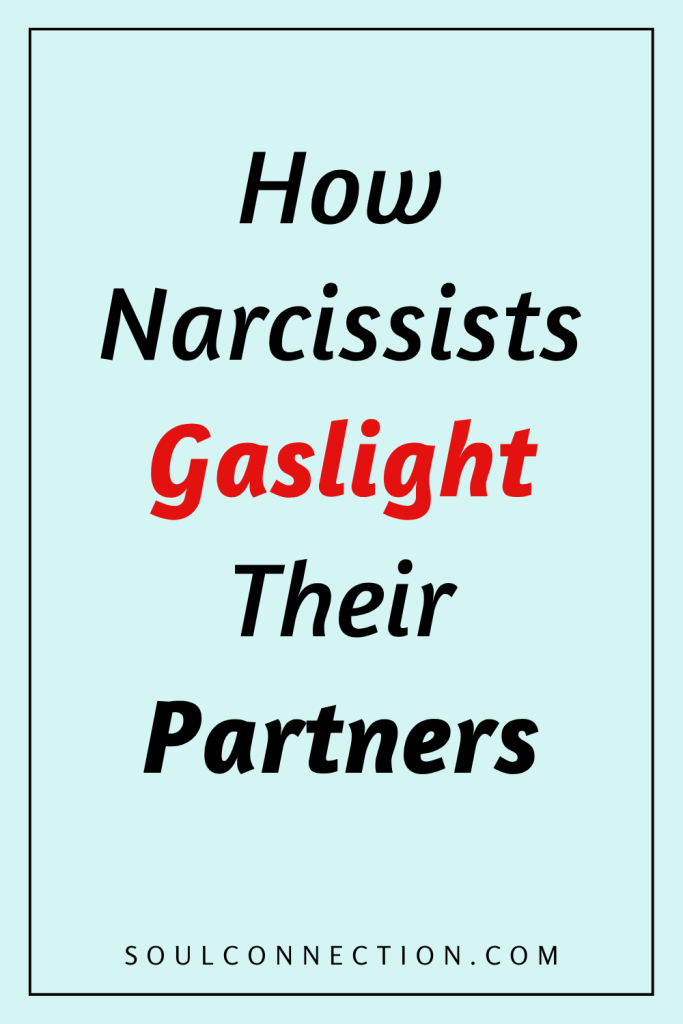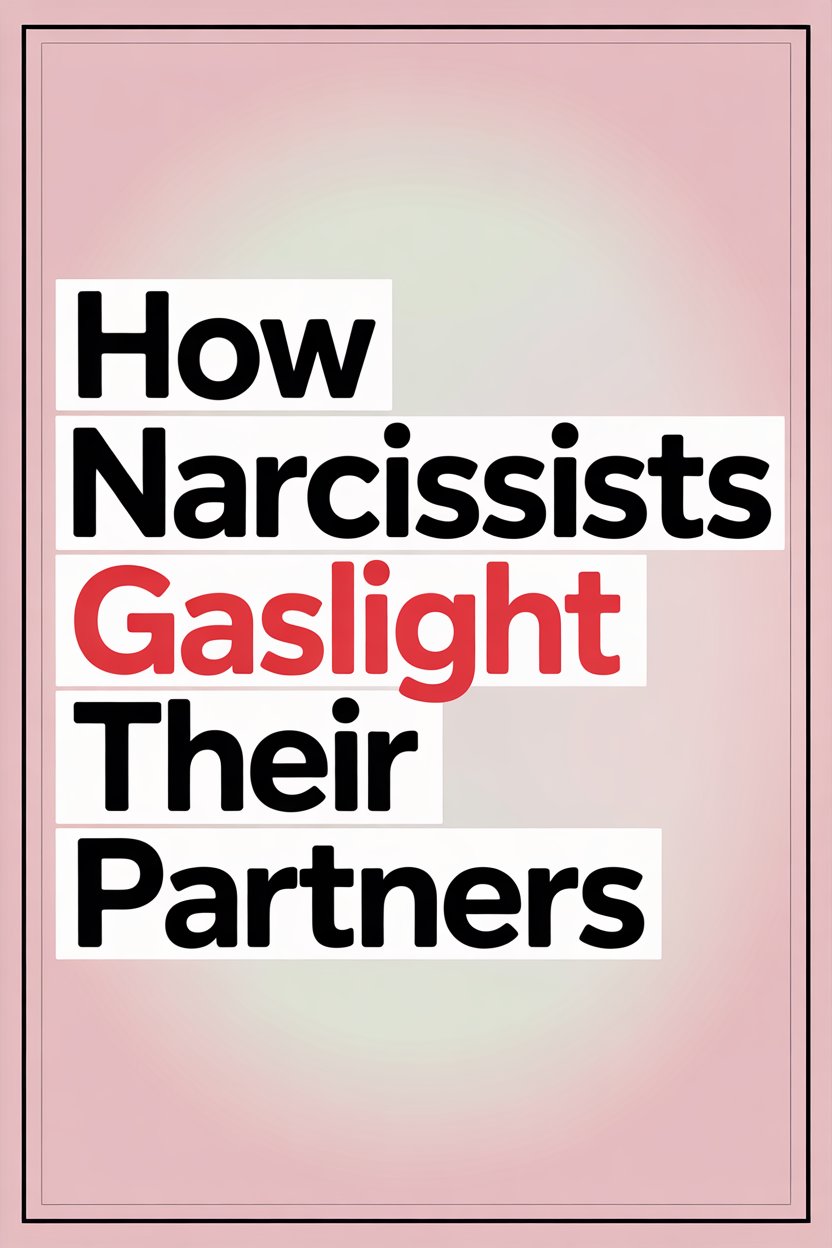Gaslighting is one of those terms that’s somehow both overused and under-explained. It’s splashed across social media, weaponized in Twitter arguments, and whispered in therapy offices everywhere.
But for anyone living with a narcissist, gaslighting isn’t just a buzzword—it’s the air you breathe, the water you swim in, and the reason your self-esteem is currently hiding under the bed with the dust bunnies.
Here’s what gaslighting really means, how narcissists wield it, and—most importantly—how to regain your sanity when reality feels like a moving target.
When Reality Bends: What Gaslighting Actually Is
Quick refresher: gaslighting is a psychological trick where someone makes you question your memory, perception, or sanity.
The name comes from a play (and a subsequent Ingrid Bergman film) where a husband manipulates his wife into thinking she’s losing her mind, all while he’s the one dimming the lights. Literally.
Narcissists weaponize this tactic like it’s their Olympic sport. They don’t just disagree with you—they convince you that you’re confused, “too sensitive,” or flat-out nuts.
If you’ve ever wondered, “Wait, did that really happen, or am I imagining things?” Congratulations, you’ve been on the receiving end.
Common Gaslighting Techniques Narcissists Love
Gaslighting isn’t a single move; it’s a full choreography. Narcissists have a whole toolbox of tricks, each shinier and more infuriating than the last.
Denial That Would Impress a Politician
Caught red-handed? Not in a narcissist’s world. If you find evidence—a text, a charge on the credit card, a lipstick mark that’s definitely not your shade—they’ll look you right in the eye and say, “That never happened.”
Suddenly you’re wondering if you need new glasses. Or a new brain.
Twisting the Narrative Until You’re Dizzy
Ever left an argument feeling like you just ran the wrong way down an escalator? Narcissists have a talent for flipping any story, so you end up apologizing for their behavior.
Example: You ask about their rude comment at dinner. By the end, you’re apologizing for “misinterpreting” their “joke.” (You know, the one that made you want to throw your breadstick.)
Blame-Shifting Like It’s a Hot Potato
Responsibility is kryptonite to a narcissist. If they’re late, it’s because you didn’t remind them. If they shout, it’s because you “made them angry.”
Sure, they act like adults, but when accountability enters the chat, suddenly they’re toddlers in a sandpit.
Minimizing and Dismissing Your Feelings
Tears in your eyes? Hurt by their words? To a narcissist, that’s just “overreacting.” Feelings only count when they’re on the receiving end. Yours, meanwhile, are “dramatic,” “irrational,” or “too much.”
Next thing you know, you’re apologizing for having emotions at all. (Spoiler: that’s not normal.)
Gaslighting By Proxy
There’s nothing quite like a narcissist recruiting the whole neighborhood for their cause. Suddenly, friends or family are echoing the same lines: “Maybe you’re just remembering wrong.” “You know how sensitive you are.”
It’s like a gaslighting flash mob, and you’re the bewildered audience.
Why Narcissists Gaslight: Not Just For Fun
It would be comforting to imagine narcissists gaslight out of boredom, but their reasons run deeper—and, frankly, more self-serving.
Their self-esteem is built on quicksand. Any hint of accountability, or any suggestion they’re not perfect, feels like a personal attack.
Gaslighting lets them deflect, avoid blame, and keep the upper hand. If you’re always doubting yourself, you’re less likely to call them out or leave.
In other words: it’s about control. Gaslighting isn’t just a bad habit, it’s a power move.
How Gaslighting Warps Your Mind and Relationships
Gaslighting is rarely a dramatic blowout. It’s a slow drip of confusion: little lies, subtle digs, and the constant buzz of self-doubt.
Over time, you might notice:
- Anxiety about bringing up issues (walking on eggshells, anyone?)
- Apologizing for things that aren’t your fault
- Forgetting your own needs
- Isolating yourself, because it’s easier than defending your sanity
If your confidence has evaporated and you find yourself second-guessing everything—even your favorite pizza topping—it’s not you. It’s the gaslighting.
Spotting the Subtle Signs: Are You Being Gaslit?
Some signs of gaslighting are as obvious as a clown at a funeral. Others are sneakier. Here’s what to watch for:
- You over-explain, constantly defending your thoughts or actions.
- You keep secrets about the relationship, even from close friends.
- “Sorry” is your new favorite word, but you’re not actually sure what you’re sorry for.
- You excuse your partner’s behavior, even when it’s inexcusable.
- You feel like a shell of your former self, and nostalgia for your own personality hits hard.
If this feels familiar, trust your gut. It’s a better judge than you think.
Why Leaving Feels Impossible (And Why It Isn’t)
Narcissists don’t just gaslight; they create a whole ecosystem where leaving feels unthinkable. Fear, guilt, and hope are powerful adhesives.
But here’s the thing: gaslighting only “works” when you’re locked inside the narcissist’s reality. Once you peek over the fence, it’s hard to unsee.
It’s not about being “strong enough.” It’s about seeing through the fog, even for a moment.
Baby steps count. Telling one trusted friend, writing down what actually happened, or setting a tiny boundary—they all chip away at the illusion.
Practical Ways to Fight Back Against Gaslighting
Getting your bearings back isn’t about out-arguing a narcissist (spoiler: that’s a losing game). It’s about reclaiming your sense of reality, one brick at a time.
Document Everything (Your Sanity Log)
Narcissists hate receipts. Keep a private journal—physical or digital—where you jot down conversations, incidents, and your feelings in the moment.
Nothing fancy needed. A sticky note that says “Was told I’m crazy for the third time today” does the trick. Later, when your memory’s been put through the spin cycle, you’ll have something solid to hold onto.
Find Your People
Gaslighting thrives in isolation. The more alone you feel, the harder it is to see the truth.
Reach out to friends, family, or a therapist—anyone who knows the old you. Sometimes just hearing, “No, you’re not losing it,” is enough to start the healing.
Set Minuscule Boundaries
Big boundaries can feel like climbing Everest in flip-flops. Start small: “I need a minute before we talk about this.” “I won’t answer messages after 10pm.” Tiny boundaries send a big message—to them, and to yourself.
Trust Your Gut (Seriously)
If your instincts are waving red flags, don’t ignore them. Even if your partner has you doubting your capacity to pick out matching socks, deep down you know what’s real and what’s gaslighting.
Try asking yourself, “If my best mate told me this story, what would I say?” Often, the advice is clearer from the outside.
Seek Professional Help
Therapists aren’t just there to hand out tissues and nod meaningfully. A good one can help defog your brain, validate your experience, and help you plot an escape—or at least build a sturdier mental fence against gaslighting.
If therapy isn’t accessible, online support groups and helplines are a lifeline. There are people out there who get it.
The Sneaky Comeback: Self-Compassion
Gaslighting’s nastiest legacy is the voice it plants in your head—a critic that mimics the narcissist’s greatest hits. Kicking that voice out is a long game.
Start with small acts of kindness to yourself. Things you enjoyed before life became a funhouse mirror: music, books, food, walks. Not revolutionary, but each one is a step back toward yourself.
Forgive the confusion. Be gentle with the need for reassurance. You’re not weak, just human.
Breaking the Cycle
No one signs up to be gaslit. The longer you’re inside it, the harder it is to see—and the more it feels like “this is just how relationships are.” Spoiler alert: They’re not.
If you’re reading this and seeing your life between the lines, it’s not too late to redraw your own. Change doesn’t happen overnight, but recognizing the problem is already a plot twist.
Give yourself credit for even wondering if things could be better. That’s where real change starts—one tiny, stubborn belief at a time.
Regaining Your Reality (And Why It’s Worth It)
Narcissists are world-class illusionists, but the real magic trick is remembering your own truth.
Every time you question their narrative, every time you trust your own memory, every time you say, “Hang on, that’s not right”—you reclaim a little piece of yourself.
Stepping out of a gaslit relationship is messy, complicated, and occasionally requires the emotional equivalent of a hazmat suit. But on the other side? Clarity. Self-respect.
Maybe even laughter again—at least, the genuine kind, the type you don’t have to justify or shrink.
Reality looks pretty good when you finally get it back in your hands.
And that, my friend, is worth every ounce of the struggle.


